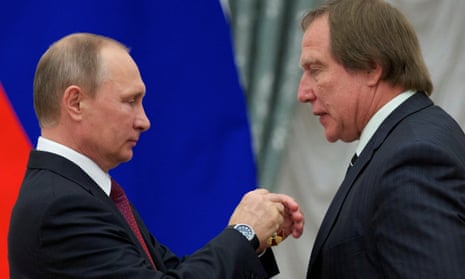Four bankers who helped Vladimir Putin’s close friend Sergei Roldugin move millions of francs through bank accounts in Zurich have been convicted of financial crimes in Switzerland.
The four were found guilty on Thursday of failing to carry out proper checks on financial transactions involving Roldugin’s accounts with the Swiss branch of the Russian bank Gazprombank.
Roldugin, a cellist from St Petersburg, has known Putin since they met in the 1970s in the Soviet Union. He introduced Russia’s president to his now ex-wife Lyudmila Putina and is godfather to Putin’s eldest daughter, Maria.
The musician’s secret financial affairs came to light in 2016, as part of a leak of millions of documents from Mossack Fonseca, the world’s fourth-biggest offshore law firm. Named the Panama Papers, they revealed a network of offshore deals and vast loans worth $2bn, with the trail leading to Putin.
The leak – published by the Guardian and a consortium of international journalists – suggested Roldugin was a proxy for the president’s hidden fortune. The cellist was allegedly one of several “wallets”, including family members and trusted friends.
The banking executives helped Roldugin deposit huge sums between 2014 and 2016 in private Swiss bank accounts.
The men, who cannot be identified under Swiss reporting restrictions, were found guilty at a hearing at Zurich district court and were given suspended fines totalling hundreds of thousands of Swiss francs.
One of them has a British passport as well as Russian citizenship. Two others are Russian nationals, and the fourth is a Swiss citizen.
The case highlighted how people like Roldugin were used as “strawmen”, the indictment said, as a way to hide the true owners of money.
In Switzerland, banks are obliged to reject or terminate business relationships if there are doubts about the identity of the contracting party.
The four executives helped Roldugin operate two bank accounts at Gazprombank in Zurich, through which millions of francs flowed, without conducting sufficient due diligence, the court heard.
Documents found in the Panama Papers included Roldugin’s passport and a form to open a Swiss bank account. Gazprombank should have identified Roldugin as a “politically exposed person” or PEP, given his connections at the top of the Kremlin.
This would have triggered enhanced scrutiny of the account. Instead the word “no” was typed in answer to the question: “Is the customer a PEP?”, a violation of Swiss law.
The prosecution had alleged the men failed to do enough to determine the identity of the real owner of the funds and that it was implausible that Roldugin could be the real owner.
Sums of about 30m Swiss francs were involved in the case, said the public prosecutor Jan Hoffmann.
This was despite the musician, who appears on Switzerland’s list of Russians issued with sanctions, having no listed activity as a businessman.
At the time, the musician told the New York Times that he was certainly not a businessman and did not himself own millions, according to the indictment. “Guys, to be honest I am not ready to give comments now … These are delicate issues,” he said, when asked to explain the hundreds of millions of dollars flowing through his accounts.
The Panama Papers revealed Roldugin had acquired a 12.5% stake in Russia’s biggest TV advertising agency, Video International, which has annual revenues of more than £800m. He also owned 3.2% of Bank Rossiya, a St Petersburg private bank has been described as Putin’s “crony bank”.
The US imposed sanctions on it after Russia’s previous invasion of Ukraine in 2014 and annexation of Crimea.
Roldugin was among scores of members of Putin’s inner circle to face sanctions from the west, including Switzerland, after Russia’s full-scale attack on Ukraine last year.
“All the evidence runs contrary to Sergei Roldugin being the real owner of the assets,” Hoffmann told the court at an earlier hearing. “The bankers have not followed the rules and should therefore be punished,” he added.
Putin has in the past described Roldugin as a friend, a brilliant musician and a benefactor, who honestly earned some money from a minority stake in a Russian company.
The Kremlin has previously dismissed any suggestion that Roldugin’s funds are linked to the Russian leader as anti-Russian “Putinophobia”.
It says Putin’s finances are a matter of public record and he has regularly declared his assets and salary to Russian voters.
The defence had argued that Roldugin had confirmed in writing last year that the bank had correctly identified him as the beneficial owner of the accounts.
There had also been no reason to doubt that Roldugin was the real owner of the accounts, and it was “plausible” that Roldugin was rich because he was a friend of Putin, it had been argued.
“Sergei Roldugin is not just any cellist and conductor, but also a Kremlin favourite who obviously had access to special financing possibilities that allows him to accumulate substantial wealth,” the defence said, according to a pre-trial briefing.
Although this kind of favouritism might be frowned upon in Swtizerland, this was not relevant to the case, the defence said.
